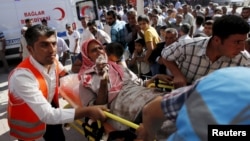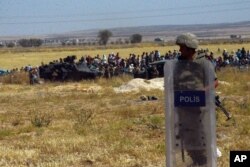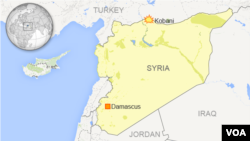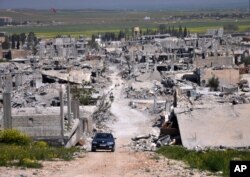Islamic State fighters launched two major attacks in northern Syria on Thursday, a fresh offensive on the Kurdish-held border city of Kobani and a push into government-held areas in the mostly Kurdish town of Hasaka.
The attacks came after the Islamic State group suffered a series of setbacks in northern Syria against Kurdish forces in recent weeks.
A Syrian Kurdish politician, Gelo Isa, told VOA that Islamic State fighters carried out multiple suicide attacks in and around Kobani, killing 23 civilians in one of them. He said several Islamic State militants were also killed.
Turkish border claims
Isa also said a group of Islamic State fighters entered Kobani from Turkey and "randomly killed civilians who came out to see what was going on."
He said the militants wore Kurdish military uniforms and carried Free Syrian Army flags in an effort to deceive security guards.
Zara Musto, a journalist based in Kobani, told VOA Islamic State vehicles with fighters wearing Kurdish uniforms arrived at a checkpoint south of the city Thursday. Musto said guards let the vehicles pass.
Turkey has denied claims that any Islamic State fighters crossed from Turkey Thursday in an attack on Kobani.
Kurdish fighters backed by U.S.-led airstrikes took control of Kobani in January following months of clashes with Islamic State forces. It was seen as an important, symbolic victory in the fight against the Islamic State group.
Khattar Abou Diab, a political science professor at the University of Paris, told VOA he thinks the Kurds do not have enough manpower to defend the territory they control around Kobani.
Diab said Islamic State fighters most probably attacked from the Syrian town of Jarablus and were disguised in uniforms worn by either Kurdish militia fighters or the Free Syrian Army.
Battle for Hasaka
Also Thursday, the Britain-based Syrian Observatory for Human Rights reported Islamic State forces seized two neighborhoods from government forces in Hasaka. Syrian military sources denied the report and said government forces repelled the jihadist attack, according to Reuters.
The Observatory's Rami Abdel Rahman said Islamic State fighters have taken control of the districts of Nashwa and Shariah, adding that fighting and clashes are continuing and thousands of residents are fleeing from those areas for safer ground.
Control of Hasaka is divided between Kurdish and Syrian government forces. The city has come under repeated attack from the Islamic State militants.
Government-held parts of Hasaka are one of President Bashar al-Assad's last footholds in the northeast region bordering Iraq and Turkey.
Southern Front
Meanwhile, a coalition of rebels known as the Southern Front alliance attacked government positions Thursday in the southern city of Daraa in what appears to be a long-promised offensive.
The Observatory reported heavy clashes and artillery fire in Daraa, where the uprising against Assad began in 2011.
The official Syrian Arab News Agency confirmed the fighting, saying six people were killed and 13 wounded.
There were no other immediate reports on the success of the offensive by the Southern Front, which is composed of 54 rebel groups and has for months promised to carry out a so-called "Southern Storm" assault in the area.
The alliance includes fighters from the mostly defunct Free Syrian Army, who have been trained and armed by the United States and its allies. But the coalition, which also includes Islamist groups, has struggled to gain full backing from the West.
If Daraa falls, it would be the third provincial capital lost by Assad in the four-year-long war, after Islamic State-held Raqqa and Idlib, which is held by another rebel alliance.
The Islamic State attacks Thursday follow two weeks that saw Kurdish forces advance deep into the Islamist group's territory, to within 50 kilometers (30 miles) of its de facto capital Raqqa.
While the latest Kurdish advances in Syria have shifted momentum against the jihadists, Islamic State fighters have adopted a tactic of advancing elsewhere when they lose ground.
Fighting in Syria has killed more than 220,000 people since the conflict there began in March 2011.
Ed Yeranian contributed to this report from Cairo. Some material for this report came from Reuters and AP.








